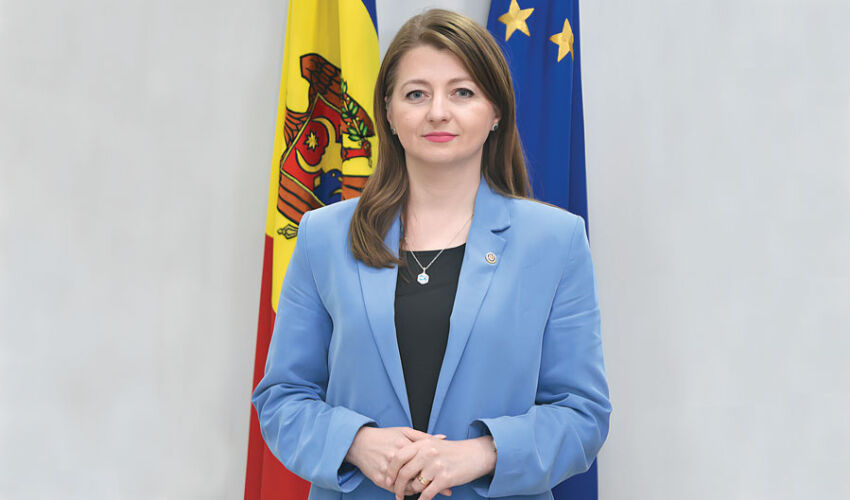
Veronica Mihailov-Moraru
How fair are these assessments and judgments, what has been accomplished in reforming the justice system and what remains to be done? These and other questions were answered by Minister of Justice Veronica Mihailov-Moraru in an exclusive interview for Logos Press.
LP: – Madam Minister, the judicial reform of recent years has become a key element of both internal modernization of the country and relations with external partners on the path of European integration. What is the current stage of this reform? What has been achieved and what remains to be done?
– Indeed, the reform of justice plays an important role in the development of the country and in the European agenda. I am glad that we already have the first tangible results of the radical restructuring of the justice system. First of all, we are talking about the evaluation of judges and prosecutors, which has contributed to a significant strengthening of the system. Today we have a new composition of the judicial and prosecutors’ management bodies. All members of these structures have been evaluated on the basis of ethical criteria and financial integrity.
I am glad that not only the structure of the Superior Council of Magistrates and the Superior Council of Prosecutors has changed, but also the activity of these bodies has become more active, transparent and understandable for citizens. This is not only my assessment. Numerous surveys and studies conducted by various civil organizations confirm these conclusions. This is very important, especially given the role of these structures in cleaning up and further strengthening the judicial system. The external evaluation of judges and prosecutors will continue for some time, but the Superior Council of Magistracy and the Superior Council of Prosecutors are already acting as a stabilizing factor to ensure the selection of qualified personnel, the modernization of the system and the improvement of its quality.
It is also worth mentioning the renewal of the composition and functionality of important internal control bodies, such as the Prosecutor’s Inspectorate, the Disciplinary Collegium, the Judges and Prosecutors Evaluation Collegium and other specialized structures. This creates certain guarantees of stability, efficiency and sustainable development of the system. After all, the external evaluation is a short-term measure. It will be completed by the end of 2025. After this stage, the system should function sustainably, on the basis of clear, transparent and effective mechanisms of selection and continuous evaluation, based on the criteria of professionalism and integrity.
Not only is the structural transformation of the judiciary and the prosecutor’s office underway, but new mechanisms are being developed with clear and understandable criteria for the selection and evaluation of personnel based on professionalism and integrity. This process involves not only specialized boards, but also representatives of civil society, which makes it more transparent and effective.
The work of inspectorates – both judicial and prosecutors – has become more visible and effective. Complaints about the actions of judges and prosecutors are reviewed faster, more reasoned decisions are made, and the public is informed of the results. Even complaints that remained unanswered for years are now analyzed and sanctions, sometimes quite severe, are applied to violators.
An important step in consolidating the gains made was the establishment of the new Supreme Court, which includes the first six judges who have undergone the vetting process. For the first time, not only professional judges, but also lawyers, prosecutors and university professors with a minimum of ten years’ experience in this field can apply for this position.
LP: – Pardon me, I want to clarify. You talk about an improved response to complaints about the activities of judges and prosecutors. But this is not felt in the society…
– People will feel the results in time. Perhaps they are not so visible from the outside. Nevertheless, the reports of the Inspectorate of Judges and the Inspectorate of Prosecutors for 2024 and early 2025 clearly show a positive trend compared to the period 2022-2023. Moreover, the inspectorates have started to conduct monitoring visits on the management of courts and prosecutor’s offices, a practice that was practically not carried out before. There are also cases of imposing sanctions for identified violations. I am confident that this practice will continue and will become an effective mechanism for improving the work of the justice system.
Of course, the most important component of the reform remains the fight against corruption. I would like to remind you that in 2024, specialized panels for corruption and related offences were created within the Chisinau Court, which have already shown positive results (more than 100 verdicts passed between 2024 and early 2025). This was also possible thanks to legislative changes that simplified the judicial practice and prioritized the examination of corruption cases. According to the report of the Chisinau Court, the number of such cases is 50% higher than last year.
Most importantly, cases of large-scale corruption and high-ranking officials have been brought to court more frequently. Several officials have been convicted, and recently a conviction was handed down for involvement in a bank theft. It is also worth recalling that the Chisinau airport has been returned to state control, and after the final verdict of Ilon Shor, measures are being taken to confiscate assets, return property and compensate the state for damages.
In addition, over the last two years, the Ministry of Justice has developed and presented to Parliament a new mechanism for the confiscation of criminal assets. The specialized Agency for the Recovery of Criminal Assets (ARBI) now has more tools and powers to confiscate assets both domestically and abroad. All specialized agencies – the National Anti-Corruption Center, the Anti-Corruption Prosecutor’s Office, the Service for Prevention and Combating Money Laundering, the Inspectorate General of Police, etc. – have become more coherent and adapted. – have become more coherent and adapted to the new challenges.
Another important element of the reforms was the change of the judicial map, which made the courts closer and more accessible to citizens. The Prosecutor’s Office has also aligned territorial offices with the new zones. Regionalization of police inspectorates is planned in the future.
With regard to human rights, progress has also been made, with improved protection mechanisms against discrimination, greater protection for victims of domestic violence, and better access to information.
At the same time, we are well aware that there is still much work to be done – justice reform is far from complete. We still have a lot to do in terms of protecting citizens’ rights, fighting corruption and in other areas. Nevertheless, a solid legislative base has been laid, which allows us to move forward – to the effective realization of the set goals.
LP: – External partners provide financial support to the justice reform in Moldova. There is constant criticism in the society about how effectively these funds are spent. Can you clarify how much money Moldova has received for the justice reform over the last 5 years, under what conditions and what they were mainly spent on?
– When we talk about support from external partners, it is important to realize that judicial reform is a rather specific process. Its results are not always as visible as, for example, in the construction of roads or hospitals. We are talking about such areas as staff training and development, digitalization of court procedures, etc.
With the help of international partners, we have implemented many projects aimed at improving the qualifications of lawyers, conducting expert examinations, institutional reforms, introduction of modern management methods and court procedures. For example, an integrated court case system is being improved, which allows tracking every stage of a case and hearing. The electronic dossier system (e-dosar) is already being implemented.
I recently visited the Balti court, where an electronic courtroom – e-room – has been equipped with the support of external partners. The e-dossier is used there, as well as fully remote hearings, simultaneous translation and other technologies.
The process of digitalization of courts will continue over the next three years. This is part of the Economic Growth Plan, aimed both at improving the efficiency of the courts and at increasing citizens’ access to justice in an online format and the development of e-services.
Thanks to the support of external partners, primarily USAID, four model courts in the Republic of Moldova have been modernized, where all the necessary conditions for the work of judges and the organization of processes have been created. It is especially important that, according to surveys, citizens in these regions are more satisfied with the activity of courts, accessibility and clarity of services provided.
We should not forget that the process of vetting is supported by external partners, first of all by the European Commission. This process should be completed by the end of this year.
LP: – But still, can you give at least approximate amounts spent on justice reform in recent years?
– I can’t give specific amounts, because the funding comes from different sources, under different conditions and with different payment terms. The Ministry of Justice largely does not manage these financial flows, with few exceptions. Many projects last for years and are financed both from external sources and from the state budget. All external financial flows are coordinated by the Ministry of Finance and all expenditures are transparent. As for the projects managed directly by external partners, detailed information on them is regularly published and available.
LP: – Among the main complaints of the public and the business community against the judicial system are impunity of judges, corruption, and restriction of electoral rights. Do you agree with these assessments? Are there any arguments to the contrary?
– I am convinced that we all have the same goal – for the rule of law to really function in Moldova. In recent years, we have been doing everything possible to protect the rights of every citizen and the business environment, so that all legal institutions of the state work efficiently.
It is important to realize that any corruption damages the state and society, hinders investments and development. We are building the future of our country. And any corruption – political, economic, electoral – must be stopped, so that this future is not taken away from our children.
We have an independent judicial system. No one has the right to interfere in the activities of judges, to dictate whom to prosecute and whom not to prosecute. The law must be applied equally to everyone. Of course, there are still unresolved cases, but more criminal cases have been opened against high-ranking officials and more sentences have been handed down, including to judges.
LP: – Many experts in the field of justice argue that the vetting process has led to a severe shortage of personnel in the judicial system, which affects its quality. Are you satisfied with the results? Are there any negative consequences of these procedures and what should be done to improve the situation?
– There are no perfect mechanisms. It should be understood that the judicial system of the Republic of Moldova was in a critical state – practically destroyed. The society demanded a deeper and more serious reform than the previous ones. Vetting and pre-vetting are an integral and necessary part of this reform.
It is important to note that the European Commission and other EU institutions are continuously and seriously monitoring the external evaluation of judges and prosecutors. And they recognize the significant progress made by Moldova in these areas. The Supreme Court has confirmed most of the decisions of the evaluation commissions. Anyone who disagrees with the results has the right to challenge them, and this is indeed happening.
Thus, the positive results are obvious. As for the shortage of staff – this is indeed a serious problem for all state institutions, but it is solvable. We are gradually and carefully stabilizing the situation. Competitions for vacant positions are announced regularly, the National Institute of Justice annually graduates new qualified specialists who join the ranks of judges and prosecutors. The Supreme Council of Magistracy and the Supreme Council of Prosecutors regularly organize competitions for promotion of judges and prosecutors, their transfer to ensure the functioning of the system.
LP: – Recently the scandal around the amnesty law has been actively discussed. Could you please explain how this situation arose? Why has no one been held responsible for mistakes or negligence in adopting the law so far?
– The situation around the amnesty law arose due to a number of factors. First, there were violations in the implementation of the law and consideration of applications from penitentiary institutions and courts, which led to undesirable consequences.
Second, there was a lack of proper coordination in the development and adoption of amendments to the law, which were introduced several months apart. Many institutions were not involved in the process at all stages to understand the essence of the project as a whole. As a result, the process of implementation of the law itself was unsuccessful, which seriously affected its application.
The Constitutional Court has already suspended the amnesty law and the matter will be further considered. The Ministry of Justice has initiated an official investigation into the correct application of the law by officials and into the cases of persons released under its provisions or other early release mechanisms.
The investigation has already been completed, with 16 people being disciplined and three of them suspended. As a result of appeals, four release decisions have been overturned, three people have already been returned to prison, and one is wanted. The law enforcement authorities are continuing their investigation with a view to possible criminal prosecution, should there be grounds for it.
The Ministry of Justice had also sent appeals to the Higher Council of the Judiciary to verify the actions of certain judges, the National Integrity Authority, the Union of Lawyers and the Disciplinary Commission of Judicial Experts to verify possible professional misconduct. Thus, the response to the problem was timely and effective.
As for the allegations that the problems could have been avoided at the stage of drafting the law, I would like to point out that the draft was reviewed before adoption and did not give rise to any significant comments. The shortcomings became apparent in the process of subsequent amendments and application of the law, as we have already discussed.
LP: – One of the most painful issues is the fight against electoral corruption, especially with regard to pensioners and vulnerable categories. At the same time, as independent lawyers note, protocols are drawn up with gross violations of the law and the rights of citizens. Why does the Ministry of Justice not react to such cases? And why are only opposition parties suspected of electoral corruption?
– Unfortunately, lately we have really encountered cases of mass electoral corruption. This threatens the future of our state. The Ministry of Justice has repeatedly stated that any form of corruption should be punishable, including electoral corruption. And it does not matter which party representatives are involved – the law should be applied equally to all.
If there are cases of violation of the rights of citizens when drawing up protocols or failure to comply with the necessary procedures, there is a possibility to appeal them in court. This is how the legal system works: every citizen has the right to defense.
But at the same time we cannot deny that there are confirmed serious cases of electoral corruption – large amounts of cash in territorial organizations have been found, evidence of illegal financing of election campaigns has been revealed. Prevention and punishment of such acts is the duty of a legal and democratic state.






